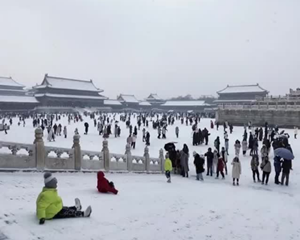Freezing weather gripped large swathes of China on Thursday, forcing closures on parts of the highways linking Beijing to other major hubs.
本周四,中国大部分地区遭遇了严寒天气,连接北京和其他主要交通枢纽的部分高速公路被迫关闭。
Snow has been building since Monday in the capital of nearly 22 million.
从周一开始,这座拥有近2200万人口的首都就一直在下雪。
Forecasters warned temperatures in northern regions could approach historical lows for this time of the year or even surpass records.
天气预报员警告称,中国北方的气温可能会接近历史最低水平,甚至超过历史记录。
The cold snap is moving from several northern provinces hit by blizzards to central and southern areas and pushing deep into the lower reaches of the Yangtze River delta.
这股寒流正从遭受暴风雪袭击的北方几个省份,向中国中部和南部地区移动,并深入长江三角洲下游地区。
Forecasters said sharp falls in temperature are expected over the next two days,
天气预报员称,未来两天气温将出现大幅下降,

particularly in the south where cities like Shanghai had experienced balmy temperatures of 68℉ earlier in the week.
特别是在南方,上海等城市在本周初刚刚经历了68华氏度的温和气温。
Assistant professor of environmental studies at New York University Shanghai,
上海纽约大学环境学研究助理教授李逸飞表示,
Li Yifei says China is not an outlier in experiencing a range of severe weather conditions, be it heatwaves and droughts or extreme cold snaps.
在经历一系列恶劣天气条件,无论是热浪、干旱还是极端寒流方面,中国并非例外。
"Extremity will become the new norm. So much so that even the word 'extremity' or 'extreme weather' I think is almost becoming a misnomer, because they're not so extreme.
“极端天气将成为新常态。以至于我认为“极端”或“极端天气”这些词几乎都成了用词不当,因为它们并不是那么极端了。
They're extreme in terms of the intensity of experience, but they're not so extreme in terms of the frequency at which they happen."
就体验的强度而言,这种天气是极端的,但就发生的频率而言,就不是那么极端了。”














